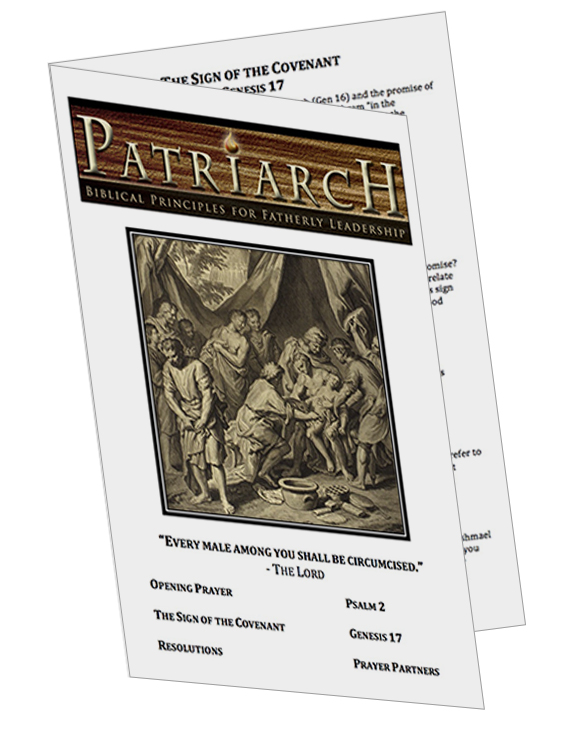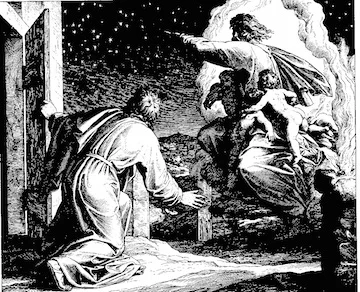“Every male among you shall be circumcised.”
The LORD
Opening Prayer Led by Group Facilitator
Psalm 2
Pray the Psalm together aloud, alternating verses between two sides. When finished, share reflections on the Psalm as a group
1 Why do the nations conspire and the peoples plot in vain?
2 The kings of the earth set themselves, and the rulers take counsel together, against the LORD and his anointed, saying,
3 “Let us burst their bonds asunder, and cast their cords from us.”
4 He who sits in the heavens laughs; the LORD has them in derision.
5 Then he will speak to them in his wrath, and terrify them in his fury, saying,
6 “I have set my king on Zion, my holy mountain.”
7 I will tell of the decree of the LORD: He said to me, “You are my son, today I have begotten you.
8 Ask of me, and I will make the nations your heritage, and the ends of the earth your possession.
9 You shall break them with a rod of iron, and dash them in pieces like a potter’s vessel.”
10 Now therefore, O kings, be wise; be warned, O rulers of the earth.
11 Serve the LORD with fear, with trembling rejoice, lest he be angry, and you perish in the way; for his wrath is quickly kindled. Blessed are all who take refuge in him.
Glory be to the Father, and to the Son, and to the Holy Spirit.
As it was in the beginning, is now and will be forever. Amen.
The Sign of the Covenant
1. How much time has elapsed between Ishmael’s birth (Gen 16) and the promise of Isaac (Gen 17)? What has been going on between God and Abram “in the meantime”? What are my expectations of my relationship with God “in the meantime” between significant spiritual events?
2. Why does God rename Abram? How is the title and promise of “Abraham” applicable to every Patriarch? If God names me a “father of a multitude of nations,” how would that raise my expectations of my fatherhood?
3. God repeats the word “covenant” 12 times in this chapter. What is God’s promise? What is Abraham’s obligation? How does the sign of this covenant directly relate to Abraham’s fatherhood and fruitfulness? How might the “visibility” of this sign affect a Jewish man’s relationship with God? How is my relationship with God “visible”?
4. What do you think about Abraham’s response to God’s pledge about Sarah’s fertility? How is it related to the name of Sarah’s son? When have you ever considered God’s promises “too good to be true”?
5. Of his sons, whom does Abraham prefer that God bless? Whom does God prefer to inherit the covenant? When has this precedent of God’s choice been evident before? What does this say about how man chooses and how God chooses?
6. God promises to make Abraham “exceedingly fruitful” (17:6) and to bless Ishmael and “make him fruitful and multiply him exceedingly” (17:20). How would you respond to God’s will to make you “exceedingly fruitful”? Do you want your children to be “exceedingly fruitful”? How does God’s desire for Abraham’s fruitfulness confirm or challenge your desire for your offspring?
Resolutions
Choose a resolution for this week from the suggestions below or make your own. Tap on a resolution to email it to yourself:
1. I will construct a chronology of significant spiritual events in my life, and recall how God was faithful in the “meantime” between those events.
2. I will establish a rhythm of faithful daily prayer during the “meantime.”
3. I will write a note to each of my children expressing my gratitude, pride, and hopes for their future fruitfulness.
4. I will take 30 minutes in personal prayer to examine my fatherhood in light of my call to be a “fatherhood of a multitude of nations.”
5. I will discuss with my wife ways we will make our faith “more visible.”
6. I will promote laughter in my home by sharing a humorous story or joke each day.
7. I will remind each of my children why we chose their names.
8. I will plan with my wife the way we will address sexual maturity with our children.
9. I will spend time in prayer asking God’s desires (instead of mine) for each child.
10. I will spend time in prayer asking how God wants to make me “exceedingly fruitful.”
Prayer Partners
Discuss with your prayer partner the success/failure of your previous resolution & offer a vocal prayer for one another.











